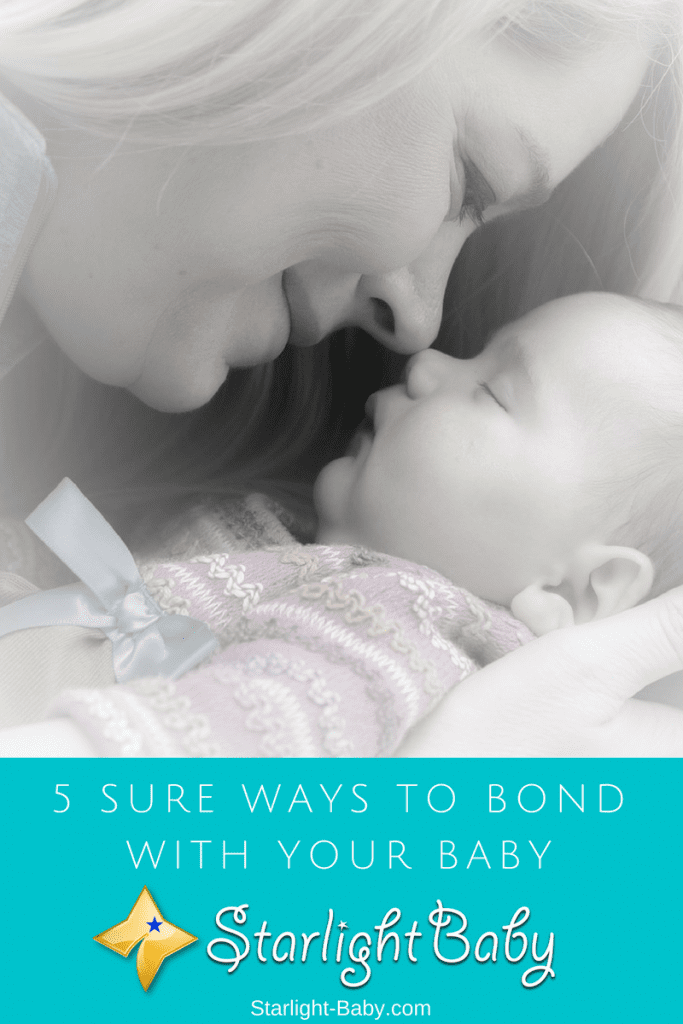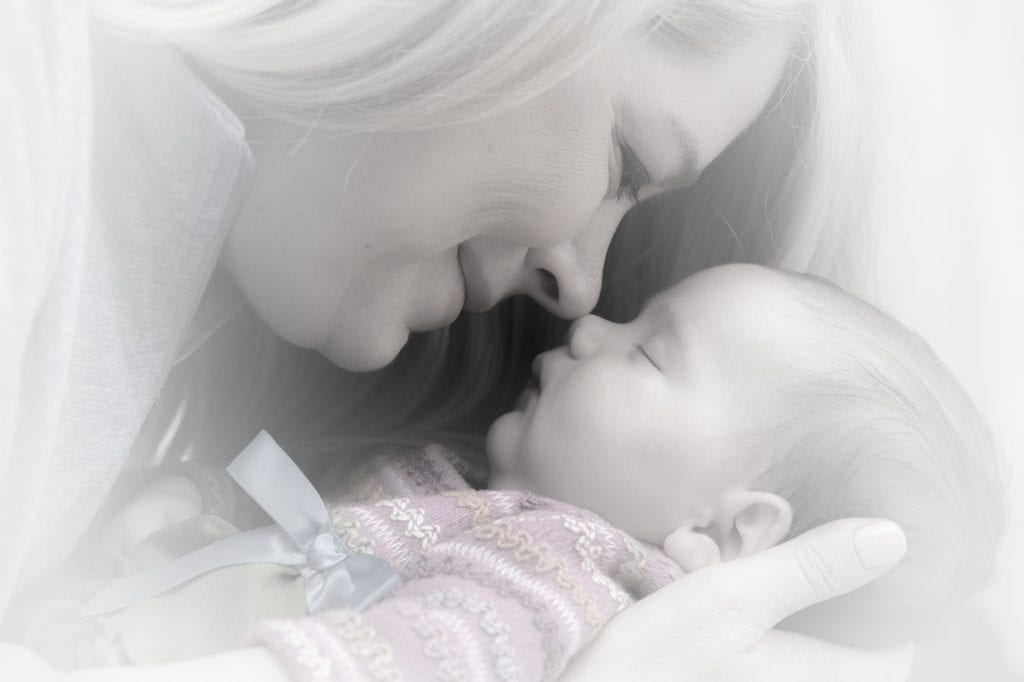 When you’re pregnant, it seems like every man and his wife has some piece of advice to give you about what to expect. From the dreaded sleepless nights to what you should eat and how to juggle everyday chores with looking after your new bundle of joy. However, one thing that’s rarely talked about, or even acknowledged, is how you can bond with your baby.
When you’re pregnant, it seems like every man and his wife has some piece of advice to give you about what to expect. From the dreaded sleepless nights to what you should eat and how to juggle everyday chores with looking after your new bundle of joy. However, one thing that’s rarely talked about, or even acknowledged, is how you can bond with your baby.
But wait, doesn’t bonding with your little one happen naturally? You’ve likely heard a million stories that all start with “the moment I saw my little one I felt a strong, unbreakable bond and a feeling of overwhelming love”. It’s something you expect to feel, because after all, they’re your flesh and blood that you’ve prepared for for around nine months and the birthing process is a natural miracle in itself. However, it doesn’t always work that way.
Why An Initial Bond Doesn’t Always Develop
 Many new parents don’t feel that unconditional, overwhelming love for their newborn after giving birth. As it’s something that’s expected, this leaves them feeling like there must be something wrong with them. They start thinking they aren’t a good parent and often fall into a depressive state.
Many new parents don’t feel that unconditional, overwhelming love for their newborn after giving birth. As it’s something that’s expected, this leaves them feeling like there must be something wrong with them. They start thinking they aren’t a good parent and often fall into a depressive state.
It’s devastating when that bond doesn’t instantly happen. However, it’s more common than you know. So why does it happen? Most likely, because of the hormonal changes that occur within the body during pregnancy and throughout the birth. A huge shift in hormonal patterns can cause numerous problems, both physical and mental.
Hormonal fluctuations are different in every woman, so that would explain why some women develop bonding issues and others don’t. So now you understand a little more about it, how can you bond with your little one? Below you’ll discover 5 useful things to try out…
1. Breastfeed When Possible
 Don’t worry if you can’t breastfeed for whatever reason, it’s not going to significantly affect your bond with your little one. You can still develop a strong bond even when bottle feeding, however it is easier if you are breastfeeding.
Don’t worry if you can’t breastfeed for whatever reason, it’s not going to significantly affect your bond with your little one. You can still develop a strong bond even when bottle feeding, however it is easier if you are breastfeeding.
It’s not just the physical closeness that comes from breastfeeding that helps with bonding – it’s also great for helping you get to know their facial expressions. You’ll soon be able to recognise various cues such as when they are content, full or restless. Baby will also star to associate you as a source of comfort. It’s advised to breastfeed as often as possible (within reason), giving baby small amounts of milk at a time.
The important thing to take away here is the fact that any type of feeding can be used as a bonding experience. As mentioned earlier, you can still bond with baby if you’re bottle feeding so don’t let anybody tell you otherwise. One of the best ways to do that is to follow the next tip…
2. Eye Contact
 By far one of the most important bonding exercises, is to maintain regular eye contact. Your little one can make and maintain eye contact from as little as two days old. Even just simply stopping for a minute, looking into their eyes and smiling will help massively with the bonding process.
By far one of the most important bonding exercises, is to maintain regular eye contact. Your little one can make and maintain eye contact from as little as two days old. Even just simply stopping for a minute, looking into their eyes and smiling will help massively with the bonding process.
This is one tip that can really help when bottle feeding. You don’t have the same physical closeness as with breastfeeding, but eye contact can help eradicate that problem. It’s also worth keeping in mind that if you’re choosing to carry your little one around in a carrier at first, it should be turned around so baby can see you and eye contact can be maintained.
3. Give Baby A Mini-Massage
 Just like eye contact, skin contact can also really help with bonding. Focusing on one small area, gently massage the skin. The hands, feet, chest and legs are all excellent places to try.
Just like eye contact, skin contact can also really help with bonding. Focusing on one small area, gently massage the skin. The hands, feet, chest and legs are all excellent places to try.
The reason this helps is because of the skin contact. As well as being looked at, babies love being close to you. Skin contact helps them to feel reassured and content and it also helps you develop a bond with your little one too.
4. Pay Attention To Your Baby’s Cries
 While babies cry a LOT, they actually have a number of different types of cries that mean different things. For example, they will use a slightly different tone when they’re crying because they are hungry, than the cry they use if they need changing. By paying attention, you’ll soon be able to distinguish between them, instantly knowing what they need.
While babies cry a LOT, they actually have a number of different types of cries that mean different things. For example, they will use a slightly different tone when they’re crying because they are hungry, than the cry they use if they need changing. By paying attention, you’ll soon be able to distinguish between them, instantly knowing what they need.
So what does this do in terms of bonding? Well, it shows baby that they can trust you. If they trust that you are there taking care of whatever they need, they’ll be more content and happier in your presence. A lot of bonding issues for new mothers occur when they feel like their baby doesn’t like them. They don’t know what their little one needs, which leads to prolonged crying and further distress. So, by learning to recognize the different cries, it really helps to minimize this issue.
5. Don’t Pay Too Much Attention To What Other People Tell You
 One thing that comes hand-in-hand with parenthood is unwanted advice. Everybody will have something to say on how you should raise your little one, even strangers! One of the main things you’ll be bombarded with advice on is sleep training.
One thing that comes hand-in-hand with parenthood is unwanted advice. Everybody will have something to say on how you should raise your little one, even strangers! One of the main things you’ll be bombarded with advice on is sleep training.
Now, a lot of people advise that you simply “let baby cry it out” during the night. There is some sense behind this, but sadly it can have the opposite effect. Yes, going to you baby every time they make the slightest noise can cause them to develop an attachment that’s hard to break. However, ignoring them when they generally need something will damage the bond between you.
If you don’t take care of their needs, they won’t see you as the nurturing, safe parent they once did. Without trust, as mentioned in the previous tip, your little one won’t always be as happy to see you! Also, if you spend too much time listening to what works for others, you’ll start to doubt your own ability to care for your baby and that will really affect your bond with them.
Conclusion
Overall, the best advice you can follow to bond with your little one is to hold regular eye contact and have as much skin-on-skin contact as possible. These simple things make a massive difference to the bond between parent and child.
If you are genuinely struggling to bond with your baby no matter what you try, it is possible you are suffering from postpartum depression. This is a serious condition that should be treated as soon as possible. Never be afraid to talk to your doctor about how you feel. As mentioned earlier, it’s a lot more common than you might think to struggle to develop an initial bond with your baby, so don’t feel bad.
Luckily, I did not really have any major problems bonding withy baby. Maybe I really am one of the lucky few but it just started very naturally. I felt this special, strong connection from the first time I held my boy. When he looked at me with his big blue eyes, I could not stop smiling.
So for me, that was our initial bond and from there on out it only grew stronger every day. I do agree with you that breastfeeding is such an amazing bonding experience and highly recommend it to all mothers. I can not even explain how it feels for the very first time. You feel completely connected to your child and it is beautiful.
I really do hope that not too many parents have to face with lack of bond with their newborns. But if you do, do not be upset. Just follow the tips described above and you will see that it will start developing and only grow stronger.
It is expected that a natural bond will occur the moment the mother sees the baby out of her womb and to think that this does not happen to many is actually not surprising as you have so clearly explained.
But with time making use of suggestions made in your blog is sure to change the scene. Some mothers somehow do not like to breastfeed their infants but that is indeed sad. In that situation they will have to work overtime to get bonded.
Paying attention to the cries of our babies will go a long way in ensuring that they have that special bonds with us, as the parents. Understanding the moment of their cries and trying as much as we could to calm them down is necessary for it will show these babies how much we care, as parents, and in the end tighten the feeling they have towards us.
I do agree with you on this @Henrywrites. Even though babies are still small, they still knows the one that shows them love and care when they are in discomfort. So by always being there to attend to a baby whenever the child is crying would definitely make the baby dot on the parents or such individual which would make the baby always feel comfortable being the person’s arms.
Breastfeeding is one of the major way in which a baby bonds well with the mother. If you take out time to observe this act, you would come to realize that babies always look straight deep into the eyes of their mother when they are sucking breast. This helps them to have their mothers face imprinted in their conscious and subconscious mind.
When my wife delivered the baby, the baby was taken away from her for more than 24 hours. The baby was born through C section and when he was born, he began shivering. The doctors thought there were some complexities, therefore, they placed the baby in the incubators in the intensive care unit. Since my wife did not see the baby for 24 hours, it was hard time bonding with the baby. The baby did not place his mouth on her nipples and would not suckle milk.